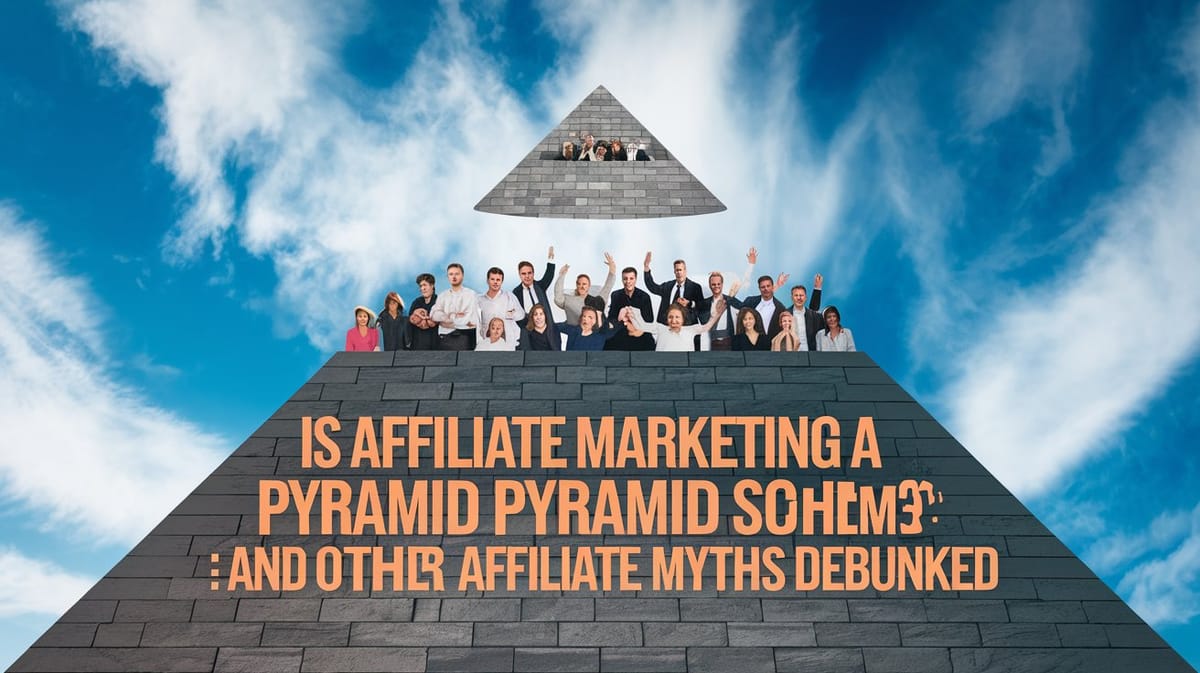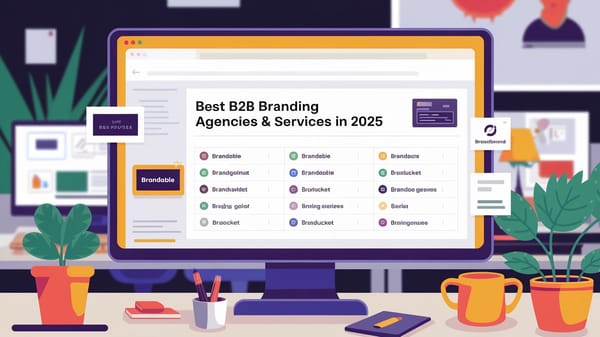Is Affiliate Marketing a Pyramid Scheme? And Other Affiliate Myths Debunked

Affiliate marketing has emerged as a formidable strategy for businesses aiming to enhance sales and expand their brand presence. Despite its growing popularity, the field is often clouded by misconceptions and myths that can deter potential marketers from exploring its full potential. This report aims to demystify affiliate marketing by addressing common myths, including the pervasive question: Is affiliate marketing a pyramid scheme?
Affiliate marketing is frequently misunderstood, with some equating it to a get-rich-quick scheme or a dubious pyramid scheme. However, these comparisons are misleading. Unlike pyramid schemes, which rely on recruiting members to generate income, affiliate marketing is a legitimate business model that involves promoting products or services and earning commissions on sales. It requires skill, effort, and strategic planning, akin to any other sales-oriented profession.
Moreover, the notion that affiliate marketing is only viable for large companies is another myth that needs debunking. In reality, small businesses contribute significantly to affiliate marketing sales, with reports indicating that they account for about 40% of all sales in this domain. This demonstrates that affiliate marketing is accessible to businesses of all sizes, offering a level playing field for those willing to invest time and effort.
Another prevalent myth is that affiliate marketing is dying. Contrary to this belief, the industry is thriving and evolving, with many brands and marketers successfully leveraging its potential. The market is valued at approximately $8.2 million, showcasing its robust growth and relevance in the current digital landscape.
You can also visit Oncely.com to find more Top Trending AI Tools. Oncely partners with software developers and companies to present exclusive deals on their products. One unique aspect of Oncely is its “Lifetime Access” feature, where customers can purchase a product once and gain ongoing access to it without any recurring fees. Oncely also provides a 60-day money-back guarantee on most purchases, allowing customers to try out the products and services risk-free.
Oncely are hunting for the most fantastic AI & Software lifetime deals like the ones below or their alternatives:

Table of Contents
- Understanding Affiliate Marketing and Its Legitimacy
- Distinguishing Affiliate Marketing from Pyramid Schemes
- Common Myths About Affiliate Marketing
- Myth 1: Affiliate Marketing is Easy Money
- Myth 2: Only Big Companies Succeed in Affiliate Marketing
- Myth 3: Affiliate Marketing Only Works in "Gray" Niches
- The Legitimacy and Growth of Affiliate Marketing
- Consumer Trust in Affiliate Marketing
- Conclusion
- Debunking Common Myths About Affiliate Marketing
- Myth 1: Affiliate Marketing is a Pyramid Scheme
- Myth 2: Affiliate Marketing is Easy Money
- Myth 3: Only Big Companies Succeed in Affiliate Marketing
- Myth 4: Affiliate Marketing Only Works in "Gray" Niches
- Myth 5: Affiliate Marketing is Dying
- The Role of Trust and Transparency in Affiliate Marketing
- Importance of Trust in Affiliate Marketing
- Transparency as a Key Component
- Distinguishing Affiliate Marketing from Pyramid Schemes
- The Impact of Transparency on Consumer Behavior
- Addressing Common Myths Through Trust and Transparency
- Enhancing Affiliate Marketing Through Trust and Transparency
Understanding Affiliate Marketing and Its Legitimacy
Distinguishing Affiliate Marketing from Pyramid Schemes
Affiliate marketing and pyramid schemes are often confused due to their multi-level structures, but they are fundamentally different in operation and legality. Affiliate marketing is a legitimate business model where individuals earn commissions by promoting products or services and driving sales through their unique affiliate links. This model is based on performance, meaning affiliates are compensated only when a sale is made through their efforts. In contrast, pyramid schemes are illegal and unsustainable business models that rely on recruiting new members to generate income, rather than selling actual products or services. The primary focus of pyramid schemes is on recruitment, and they often collapse when recruitment slows down, leaving the majority of participants at a loss (Entrepreneur).
Common Myths About Affiliate Marketing
Myth 1: Affiliate Marketing is Easy Money
A prevalent myth is that affiliate marketing is a quick and effortless way to make money. However, successful affiliate marketing requires significant effort, strategic planning, and persistence. Affiliates must invest time in understanding their niche, creating valuable content, building an audience, and continuously optimizing their marketing tactics. The reality is that, like any other sales job, affiliate marketing demands skill and effort to be profitable. While there is potential for substantial earnings, it is not a get-rich-quick scheme (Mondiad).
Myth 2: Only Big Companies Succeed in Affiliate Marketing
Another misconception is that only large companies can succeed in affiliate marketing. In reality, small businesses and individual marketers can also thrive in this field. According to a report by Awin, small businesses contribute to about 40% of all affiliate marketing sales, and for many small businesses, affiliate marketing accounts for up to 50% of their total revenue (Cpamatica). This demonstrates that success in affiliate marketing is not limited to big players; rather, it is accessible to anyone willing to put in the effort and develop effective marketing strategies.
Myth 3: Affiliate Marketing Only Works in "Gray" Niches
There is a belief that affiliate marketing is only effective in "gray" niches, such as casinos, dating, or adult content. While these areas are popular, affiliate marketing is not restricted to them. It is a versatile strategy that can be applied across various industries, including fashion, technology, health, and more. The key to success in affiliate marketing is not the niche itself but the ability to reach the right audience with the right message. Transparency and honesty in promoting products can build consumer trust and lead to successful affiliate marketing campaigns (Cpamatica).
The Legitimacy and Growth of Affiliate Marketing
Affiliate marketing is a legitimate and growing industry, with 81% of brands utilizing it as part of their marketing strategy. The industry is thriving, with a market value of $8.2 billion, indicating its widespread adoption and effectiveness as a marketing tool (Cpamatica). Unlike pyramid schemes, which are illegal and unsustainable, affiliate marketing is a performance-based model that rewards affiliates for their marketing efforts. This model aligns the interests of both the affiliate and the brand, as both parties benefit from successful sales.
Consumer Trust in Affiliate Marketing
A common myth is that consumers do not trust affiliate marketers. This misconception often stems from the association of affiliate marketing with "gray" niches. However, consumer trust is not inherently linked to the use of affiliate links but rather to the quality and transparency of the products or services being promoted. Effective brand management and honest marketing practices can build consumer trust and lead to successful affiliate marketing campaigns. It is crucial for affiliates to focus on promoting reputable products and maintaining transparency with their audience to foster trust and credibility (Cpamatica).
Conclusion
In summary, affiliate marketing is a legitimate and effective business model that is often misunderstood due to various myths. It is distinct from pyramid schemes, which are illegal and unsustainable. Success in affiliate marketing requires effort, strategy, and transparency, and it is accessible to businesses of all sizes across various industries. By debunking these myths, individuals and businesses can gain a clearer understanding of affiliate marketing and leverage it effectively to drive sales and grow their brand.
Debunking Common Myths About Affiliate Marketing
Myth 1: Affiliate Marketing is a Pyramid Scheme
One of the most pervasive myths about affiliate marketing is that it is synonymous with pyramid schemes. This misconception arises from a lack of understanding of the fundamental differences between the two. Pyramid schemes are illegal business models that rely on recruiting members who pay to join, with the promise of payments for enrolling others into the scheme. These schemes are unsustainable as they require an ever-increasing number of recruits to generate profits, which eventually leads to their collapse (Federal Trade Commission).
In contrast, affiliate marketing is a legitimate business model where affiliates earn commissions by promoting products or services and driving sales or leads for a company. The focus is on performance-based marketing, where affiliates are compensated for actual sales or leads generated, not for recruiting new members. This model is sustainable and legal, as it is based on real transactions and value creation (Business Insider).
Myth 2: Affiliate Marketing is Easy Money
Another common myth is that affiliate marketing is a quick and easy way to make money. This misconception is often fueled by misleading advertisements and testimonials that promise substantial earnings with minimal effort. In reality, successful affiliate marketing requires significant time, effort, and strategic planning. Affiliates must invest in building a strong online presence, creating high-quality content, and understanding their target audience to effectively promote products (Neil Patel).
Moreover, the competitive nature of affiliate marketing means that affiliates must continuously adapt to changing market trends and consumer preferences. This involves ongoing learning and optimization of marketing strategies to maintain and grow their income. According to a survey by Statista, only a small percentage of affiliates earn substantial income, with the majority earning less than $20,000 annually. This highlights the need for dedication and persistence to achieve success in affiliate marketing.
Myth 3: Only Big Companies Succeed in Affiliate Marketing
There is a misconception that only large companies with significant resources can succeed in affiliate marketing. While it is true that big companies often have more resources to invest in marketing, affiliate marketing is accessible to businesses of all sizes. In fact, many small and medium-sized enterprises (SMEs) have successfully leveraged affiliate marketing to expand their reach and increase sales (Forbes).
The key to success in affiliate marketing for smaller businesses lies in identifying niche markets and building strong relationships with affiliates who have influence within those niches. By focusing on specific target audiences and offering unique value propositions, smaller businesses can effectively compete with larger companies. Additionally, the rise of social media and digital marketing tools has leveled the playing field, allowing businesses of all sizes to reach and engage with potential customers (HubSpot).
Myth 4: Affiliate Marketing Only Works in "Gray" Niches
Some believe that affiliate marketing is only effective in "gray" or less reputable niches, such as adult entertainment or gambling. This myth is unfounded, as affiliate marketing is widely used across a diverse range of industries, including fashion, technology, health, and finance. According to a report by Awin, the global affiliate marketing industry is valued at over $12 billion, with significant contributions from mainstream sectors.
The versatility of affiliate marketing allows businesses to tailor their strategies to suit their specific industry and target audience. By partnering with affiliates who align with their brand values and have a genuine interest in their products, businesses can effectively reach and engage with their desired customer base. This approach not only enhances brand credibility but also drives sustainable growth across various industries (eMarketer).
Myth 5: Affiliate Marketing is Dying
The notion that affiliate marketing is a dying industry is another myth that lacks evidence. On the contrary, affiliate marketing continues to grow and evolve, driven by advancements in technology and changes in consumer behavior. The increasing popularity of e-commerce and digital marketing has further fueled the growth of affiliate marketing, making it an integral part of many businesses' marketing strategies (Statista).
Innovations such as artificial intelligence, data analytics, and personalized marketing have enhanced the effectiveness of affiliate marketing, enabling businesses to deliver more targeted and relevant content to their audiences. Additionally, the rise of influencer marketing has created new opportunities for affiliates to collaborate with brands and reach wider audiences. As a result, affiliate marketing remains a dynamic and thriving industry with significant potential for future growth (Marketing Dive).
In summary, while myths about affiliate marketing persist, the reality is that it is a legitimate and effective marketing strategy that offers opportunities for businesses of all sizes across various industries. By understanding and addressing these myths, businesses and affiliates can better navigate the affiliate marketing landscape and achieve sustainable success.
The Role of Trust and Transparency in Affiliate Marketing
Importance of Trust in Affiliate Marketing
Trust is a cornerstone of successful affiliate marketing. Affiliates act as intermediaries between consumers and brands, and their credibility significantly influences consumer purchasing decisions. According to a 2023 survey by Rakuten Marketing, 81% of consumers reported that they are more likely to purchase a product if they trust the affiliate recommending it. This statistic underscores the critical role trust plays in the affiliate marketing ecosystem.
Affiliates build trust by providing honest reviews and transparent information about the products they promote. This transparency helps consumers make informed decisions, thereby enhancing the affiliate's reputation and increasing the likelihood of repeat business. Trust is not only beneficial for affiliates but also for brands, as it can lead to higher conversion rates and customer loyalty.
Transparency as a Key Component
Transparency in affiliate marketing involves clear communication about the nature of affiliate relationships. This includes disclosing affiliate links and any potential financial incentives. The Federal Trade Commission (FTC) mandates that affiliates must disclose their relationships with brands to avoid misleading consumers (FTC Guidelines). This requirement is not just a legal obligation but also a best practice that fosters trust.
A transparent approach can differentiate affiliates in a crowded market. By openly sharing their affiliations, marketers can build a more authentic connection with their audience. This transparency is crucial in dispelling myths that affiliate marketing is akin to a pyramid scheme, where the focus is on recruitment rather than product sales.
Distinguishing Affiliate Marketing from Pyramid Schemes
Affiliate marketing and pyramid schemes are often confused due to their multi-level structures. However, they are fundamentally different. In affiliate marketing, revenue is generated through the sale of products or services, and affiliates earn commissions based on these sales. In contrast, pyramid schemes rely on recruiting new members, with earnings primarily derived from the fees paid by these recruits rather than actual product sales (Investopedia).
The transparency in affiliate marketing, particularly in disclosing earnings and relationships, helps distinguish it from pyramid schemes. Affiliates are incentivized to promote products genuinely, as their income depends on actual sales rather than recruitment. This model aligns with ethical business practices and regulatory standards, further reinforcing the legitimacy of affiliate marketing.
The Impact of Transparency on Consumer Behavior
Transparency in affiliate marketing not only builds trust but also positively influences consumer behavior. A study by Nielsen found that 66% of consumers are willing to pay more for products from brands that demonstrate transparency. This willingness extends to affiliates, as consumers are more likely to engage with and purchase from affiliates who are open about their affiliations.
Moreover, transparency can lead to increased consumer engagement. When affiliates provide detailed product information and honest reviews, consumers feel more informed and confident in their purchasing decisions. This engagement can result in higher conversion rates and customer retention, benefiting both affiliates and brands.
Addressing Common Myths Through Trust and Transparency
Several myths surround affiliate marketing, including the misconception that it is a get-rich-quick scheme or that it only benefits large companies. Trust and transparency play a crucial role in debunking these myths. By providing clear and honest information, affiliates can educate consumers about the realities of affiliate marketing.
For instance, the myth that affiliate marketing is easy money is dispelled when affiliates share their experiences and the effort required to succeed. Transparency about the challenges and rewards of affiliate marketing helps set realistic expectations for new affiliates and consumers alike.
Similarly, the notion that only big companies succeed in affiliate marketing is countered by showcasing successful small and medium-sized affiliates. By highlighting diverse success stories, affiliates can demonstrate that success in affiliate marketing is achievable for anyone willing to invest time and effort.
Enhancing Affiliate Marketing Through Trust and Transparency
The future of affiliate marketing hinges on maintaining and enhancing trust and transparency. As the industry evolves, affiliates and brands must continue to prioritize these values to foster long-term relationships with consumers. This involves adhering to regulatory guidelines, providing honest and accurate information, and continuously engaging with consumers to understand their needs and preferences.
In conclusion, trust and transparency are not just ethical imperatives but strategic advantages in affiliate marketing. By embracing these principles, affiliates can differentiate themselves in a competitive market, build lasting relationships with consumers, and contribute to the overall legitimacy and growth of the affiliate marketing industry.





